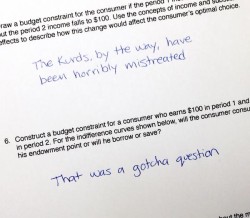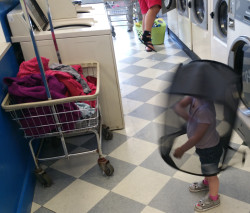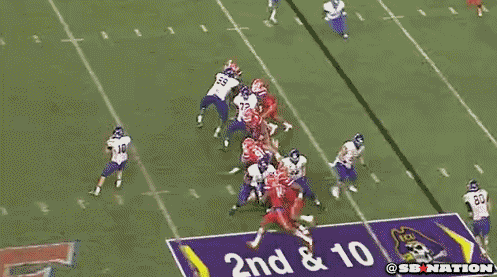Monthly Archives: September 2015
The Gators had just sealed a win over East Carolina with a fumble recovery, and Alex McCalister saw the end zone ahead of him. But his teammate, Jarrad Davis, realized that scoring another TD was unnecessary. Perhaps if McCalister had continued running, he would’ve tripped and fumbled and ECU would’ve recovered it and run another play and scored a touchdown.
But if he went to the ground, the game would end. (Of course, Davis probably ran a higher risk of causing a fumble by trying to tackle his teammate than just letting him run, but, whatever.) So Davis tackled McAlister, and Florida kneeled out the game for a 31-24 win.
Even with the context, I think that was a bad move. McCalister had a clear path and while a fumble was possible, it was more likely to occur with a tackle (even a friendly fire tackle) than otherwise.
—
In Canadian football, this is apparently a thing:
I’d be interested to know what the counterarguments on this are.
—
Welp. God is Mormon. I'm as surprised as you are.
— Ryan Noonan (@noonanville) September 5, 2015
—
No video (for obvious reasons), but there was a play in Southern Tech’s game where a kick returner ill-advisedly left the endzone to run it back. All across Colosse and the country, Packer fans said “Noooooooooo!!!!” which was followed by relief that he got to the 20, followed by “Goooooooooo!!!!” as he ran it from endzone to endzone to tie the game.
In the post-game interview, the coach said that it was an amazing effort, an amazing run, and that he has talked to the player and has been assured that it will never, ever happen again.
Vox has a list of five times that network executives were right to clip creative wings. The only one I disagree with is Jack on Lost. I think the series would have been better without him.
As commented recently by Peter: Uber, but for Big Yella.
Amiga Computers turns 30. For those of you two young to remember, in technological terms the Amiga was the iPhone of personal computing. I remember seeing them long past their prime, in the mid-90’s, and they still blew Windows and Macs out of the water.
Steven Horwitz writes about the politics of nostalgia, formerly the province of the right but having since infected the left.
Cracked looks at suicide in the Age of Twitter.
So here’s the thing… while such a relationship is entirely and utterly inappropriate, and the man should never be able to teach again, if the young lady is willing to marry the guy in order not to testify against him, I can’t say I am in favor of trying to prosecute him whether they can make a case without her testimony or no.
Good news in Mexico? Murders are declining. Bad news in Mexico, the economy is struggling. The two were supposed to be connected.
Driverless cares are, really, only the beginning.
This is pretty brilliant: Just Another Day In Hell.
It turns out, if you remove something unfavorable to liberals in the description, it may be that your social science work is more likely to be published.
The ISIS Sex Slave Market, from the point of view of the slave.
Jim Gilmore’s stealthy stealth campaign is something I still can’t quite grok.
Jonathan Coppage writes how Brad Pitt hindered New Orleans’ recovery.
Friday
The past week was exhausting, and ended in a meeting I’d been dreading, in which I got to sit through yet another round of listening to our Dean lecture the faculty at something just under a full shout, deflect the demand of a guest at the meeting that I change the agenda and forgo some crucial procedural matters so we could just get right to their concerns, then get accused of picking on and singling out one department–ironically, the one most closely allied to my own, and for whom I had just done a shitload of work, including fixing some of their required forms for them–because I raised an issue that has been bouncing around unresolved for close to a decade and that has caught up several other departments (including my own) at various times. The particular joys of that moment were 1) the marvelously passive-aggressive way it was phrased–“I feel like we’re being picked on”–to give the utterer plausible deniability about having actually accused me of picking on them (it’s just her “feels” after all), and 2) that as chair of the committee I felt it best to not say anything beyond demurring any targeting and pointing out other departments that had been negatively affected lest I appear churlish.
I was feeling churlish, of course. But a burrito, a beer, and a bourbon followed by three White Russians at the bar changed that. (more…)
In my last post, I argued that it didn’t “seem right” that a police officer would make up an “offense report” because she was refused service at a fast food place. I was also uncomfortable with the fact that she seems to have somehow gotten personal information from someone who was disinclined to provide it. I finally suggested that businesses should have the legal right to refuse business to police officers just because they’re police officers and still expect the same level of protection that any business or person ought to expect from the police.
I guess a fair question to ask of my OP is, what would have been a right way for this all to have turned out? That question can be broken into two others.
- What is the most the officer could have done to pursue her complaint and yet meet my standards for appropriate conduct?
- What would have to be true of our legal system for me to be okay with what the officer did do in this case, which was to write up an “offense report”
To answer the first question, my preference would be that the officer complain to the fast food company, using whatever avenues that already exist for a customer to issue a complaint in a related case. By “related case” I mean a case where a person is denied service for a reason not prohibited by law and where the proffered reason appears to be the real reason. In other words, I’d say it’s a different matter altogether if, say, the police officer is black and the employee says they don’t like to serve police officers but the real reason the employee is saying that is arguably that the officer is black.
My answer to the second question depends on what access any private citizen would have in a similar case. Let’s say someone refuses business to me because I am a public employee, and let’s say I have my name tag/badge that shows who I work for. Let’s also say it’s obvious from the situation that they’re not discriminating against me because of my gender, race, ethnicity, or religion. If I can call the police and the police can write up an “offense report,” then I concede that a police officer ought to be able to do the same if it happens to her/him.
I still don’t concede that I or the cop have any right to obtain contact information from an employee who declines to furnish it, especially because no crime or anything civilly actionable is being alleged. Is a crime, or at least an something civilly actionable, being alleged? Maybe. In the comments section of my last post, I referred approvingly to the idea of an “‘implied contract’ associated with being open for business” mentioned in this BHL post. Not being a lawyer, I wouldn’t know. But if it is something that I could allege and use to invoke the writing of an “offense report” and to obtain personal information from someone who doesn’t want to give it, then I suppose that an officer, as a citizen, ought to have the same prerogative.
That said, even if a cop then has the legal right to pursue the matter, I’m less certain as to whether he or she ought to pursue it. The privileges cops enjoy come with the responsibility to be judicious, and that sometimes means taking certain slights in stride. But that’s a different issue.
Now is probably the time to say that I do think it’s wrong to refuse service to someone without a “good” reason. What counts as “good” is probably in the eye of the beholder, but unless the cop in this case is leaving something out of her account, I don’t see a “good” reason to refuse her service.
Apparently, somewhere in Florida an Arby’s employee refused to serve a police officer. The police officer complained and talked to a manager. The manager laughed and said the employee doesn’t like serving cops. One or both of the the employees seems to have been reprimanded although exactly what the upshot was isn’t entirely clear to me. The company apologized, saying that Arby’s values our men and women in blue, etc., etc.
The officer filed an “offense report” over the incident, not linked to above. Here’s her narrative of what happened. I’ve retyped it, so assume all typos are my own. I’ve also redacted some information:
On this date, I responded to the above location [redacted], Arby’s, to order take-out food through the drive thru window. Upon ordering at the microphone, the clerk seemed slightly rude and short with his responses, but I was having difficulty hearing him so figured there might be a problem with their speaker system. Once I received my total, I drove to the take-out window to pay for my food.
When I drove around, the clerk, [redacted], took my credit card as a form of payment. At this time the manager, [redacted], approached the window an stated, “He doesn’t want to serve you because you are a police officer.” [Redacted] was referring to [redacted] and referenced him by looking at [redacted]. At this time, [redacted] had not processed my credit card and had to be ordered to do so, by [redacted]. I explained to [redacted] that this made me extremely uncomfortable and now wasn’t certain I wanted to dine at the restaurant. [Redacted] assured me everything was ok and handed me my food. [Redacted] even laughed and said he is allowed to refuse to serve me.
I was uncertain of the condition of my food, and felt for my safety, it would be best not to eat there. I responded inside and [redacted] provided me with a refund. [Redacted] provided me with his contact information and store information but [redacted] refused to have contact with me, ignored me and refused to provide his contact information to me.
This incident is being documented for informational purposes.
Somehow, the officer seems to have gotten information about the employee “who refused to have contact with” her, too, because on the “offense report” we see the following info about both employees: birth dates, driver license numbers, domicile address, and place of birth, which in the case of the non-cooperative employee was the Dominican Republic. I don’t know how this information was acquired. Maybe Arby’s disclosed the information from its personnel records (That’s why I’m not linking to the document itself. Too much personal information.)
The employees as far as I can see didn’t commit an “offense” recognized by law. (And one thing we don’t get from this “offense report” is that the officer was refunded her money. At least that’s what the linked-to news account above says.) I think I can also easily imagine a scenario in which the manager, as the father said in the linked to article above, was just joking. I can easily imagine why the one employee might not have wanted to disclose their personal information.
Now perhaps I’m making too much of the fact that this report is called an “offense report.” Those are the words at the top of the form, but the officer does write that the report is for “informational purposes” only. It’s probably the standard form an officer fills out when something happens regardless of whether a crime is even alleged to have been committed. The employees weren’t arrested and as far as I know and hope, they weren’t tailed or followed by the police trying to pin something on them or harass them. And I guess it’s encouraging that the officer just wrote a report and didn’t, say, kill the employees. I’d rather see more report writing and fewer incidents of brutality.
And I do believe all people should be treated with respect. If it’s true that the employees weren’t joking and were really trying to stick it to the customer, then they shouldn’t have done that. And as a pragmatic consideration, you probably want the cops on your side.
Still, the fact that the officer might have responded much more aggressively and chose not to and the fact (if it is a fact) that the employees were rude, don’t put me completely at ease. Police officers are supposed to “serve and protect” the public. If a member of the public decides they don’t wish to serve officers, that person should have that right, and, I’d add, expect the full protection of the police should, say, a robbery take place.
It was a given that there were going to be dropouts from the Republican field before we got to the first primary; it was just a matter of waiting to see who it would be.
Rick Perry is kind of a fascinating figure to be the first drop out. He went into the process once before, bombed abysmally in his first spotlight moment–just when GOP primary voters were desperately looking for an anti-Romney to rally around–and carefully prepped through the succeeding four years to avoid that kind of failure, only to not just lose again but to become the very first dropout. He blamed his 2012 flameout on back surgery and painkillers, and for all that I don’t much like the man, I find that believable. 2012 may have just been a matter of bad timing. But that doesn’t explain 2016
He’s not an incompetent politician or campaigner, having never previously lost an election and having served a record 14 years as Texas’ governor. He comes from the second most populous state in the country, a good base, and a state that has given us three presidents previously (four if you count Ike, but he was only born there, growing up in Kansas).
But he never got any momentum, polling at around 1%. Worse, money wasn’t coming in to his campaign, indicating that those who make strong campaigns possible through financing didn’t see him as a good prospect.
Let me make that clear. The big money doesn’t just go to people the big money likes–it goes to people they think have a chance, because whomever wins they want to have an open door with them, and money is the key that fits the lock. Perry’s lack of fundraising success doesn’t necessarily mean they don’t like him, but that they don’t think he had a chance.
But Perry didn’t connect on the national stage, and I’m no sure why. Maybe it’s because he tried to be a Tea Partier who was moderate on immigration. Maybe, unlike George W. Bush, he played his Texan image wrongly. W used the Texas image in a Reaganesque way, working on his ranch to buff a no-nonsense down-to-earth blue collar persona, while Perry seemed to portray a Texas that is arrogant, insular and sneering toward the rest of the country. Both Texases are real, but only one plays well.
Maybe it’s because he really is an intellectual lightweight, and in more local elections that was part of his strength because he didn’t come off as an egghead, but when he put on the smart glasses to gussy himself up he came off as playing a role, losing the desired sense of “authenticity.”
There’ll be lots of speculation, but there’ll be no hard evidence, just stories that are told more or less persuasively. Jumping into the presidential race is a crapshoot. Former VP Dan Quayle did all the right moves in the first years of the Clinton presidency to set himself up for a 1996 presidential run, criss-crossing the country talking to conservative groups and setting up grassroots organizations in the early primary states. And he’d proven in both his House and Senate campaigns in Indiana that he was an effective hard-working campaigner. But in the end he folded up shop before he ever publicly announced he was running; before most people ever became aware that he was running. The story I’ve heard is that the more people listened to him the less impressed they became.
Just as athletes are sometimes standouts in college while failing in the pros, sometimes politicians play well locally but just lack that special something that makes a person successful at higher levels.
That’s not profound. But I think anyone looking for profundity in the rise and decline of presidential aspirants is looking in the wrong place.
As we celebrate Queen Elizabeth’s term as the longest-reigning monarch, Seth Mandel explains why Americans are so fond of the Queen.
Who isn’t sold on Kim Davis’s plight?: Rod Friggin‘ Dreher isn’t.
I’d known, vaguely, that Attorney General Kathleen Kane (D-PA) was in trouble. I had no idea that the scandal was so weird, though.
Robert Greene II writes of the southern identity that Jimmy Carter and Julian Bond tried to forge.
Employers have to be careful not hire unauthorized immigrants, but not too careful, or it may cost them.
I missed out on what was probably my last chance to own an Amazon Fire Phone. Not that I really wanted one, but for $10-30? Yeah, I would have done that. Anyway, people gettin’ laid off.
 Michael Brendan Dougherty argues that immigration may be the definining issue of the 21st century. I think that’s probably more likely to be true than his belief that Romney and Mormons can save the GOP.
Michael Brendan Dougherty argues that immigration may be the definining issue of the 21st century. I think that’s probably more likely to be true than his belief that Romney and Mormons can save the GOP.
I bet this would be worth five points in the GOP primary in August a year before an election.
In an article about problems in the conservative coalition within the GOP, Daniel McCarthy and Nate Cohn make a point frequently made by Michael Cain, which is that establishment candidates win the GOP nomination on the shoulders of blue states.
The New Republic makes unexpected arguments against getting Syrians in (and also, in favor of Chris Christie against Bruce Springsteen), and against Kim Davis going to jail.
This piece on why Gulf States aren’t accepting Syrian refugees made me more rather than less sympathetic about inviting some here. And Syrians might prefer Europe to both the US and the Gulf States anyway.
If we’re looking for a relative success story for refugees of war, Bosnians in St Louis may be an example that could give Detroit hope.
Germany is getting a lot of good press for taking in so many refugees, but some of it may be that they so desperately need young people. And UK, for all of its faults, may be putting itself at a disadvantage by going about it in the more morally admirable way.
In what has to be the most obvious headline of 2015, the New York Times fears that the influx of refugees might help the far-right politically. Ya think?
Kevin Kelley made waves with his “never punt” philosophy. Now he’s got another one: explosive plays!:
Well, the Washington Post recently ran a story on Kelley’s next innovative idea that is going to buck conventional coaching, and give defensive coordinators nightmares. After using an ESPN database to study college football history, Kelley found a new trend emerge last season where teams that recorded more explosive plays of 20 yards or more won 81% of games.
Kelley also found that on typical plays where two players touched the ball (QB and RB or WR), those 20 yard plays came at about a 10% clip, but when at least three players touched the ball (on a lateral or trick play of some sort), the percentage for an explosive play almost doubled to about 20%.
This could be huge! But the statistics don’t necessarily tell us much. At best, the cause/effect is dubious.
Southern Tech had a season in the recent past where it struggled mightily. Someone did some number-crunching and decided that what the Packers really needed to do was run the ball more. In games where the offense ran the ball 60% or more of the time, they won! Less running, they lost. QED!
Except that the causality was reversed. The higher run-rate was indicative of trying to kill the clock after we’ve taken a lead. The high passing rate was the product of a team struggling to catch up against a running clock.
It wouldn’t surprise me in the least if the same were true of explosive plays. Teams with explosive plays win precisely because they’re the team that can effectively run explosive plays against the other team. Explosive plays are difficult and are more likely to require an asymmetry of talent.
Not unlike “Half Time Stats.”
When you’re watching a game, the announcers will often say something like “When Southern Tech is up by two touchdowns or more, they win 84% of the time…” which sounds impressive. It means Southern Tech can hold leads. Yay if you’re Sotech! Except that a fourteen point lead at half-time is more often than not going to be indicative of a talent asymmetry or just better play. Chances are a team ahead by that much at half time won’t just win because they can spot 14 points, but also because the way that the game has been going indicates that they are the better team. They’ll probably win the second half, too, for that reason alone.
I had everything planned to get the laundry done on Sunday so that Clancy would start her week with a fresh batch of clothes to start from.
Things didn’t work out that way as the washer just upped and died. Well, it didn’t die. It went on strike is more likely, holding up a sign saying “I am not locked!” as it pickets the utility room. All of this being my clunky or clever way of saying that the problem seems to be relatively straightforward. It’s not properly locking, and without locking it won’t start a load. Which meant that I got to spend Labor Day at the laundry mat. I have been to the laundromat a couple of times for heavy blankets. The one I go to is on the sketchy side of town, mostly because it’s the one that came up when I initially googled it, and now I’m familiar with it.
Which meant that I got to spend Labor Day at the laundry mat. I have been to the laundromat a couple of times for heavy blankets. The one I go to is on the sketchy side of town, mostly because it’s the one that came up when I initially googled it, and now I’m familiar with it.
I had vaguely figured that the best time to go to the mat is in the morning. Most of the people most likely to use it don’t seem like the type to be early risers. This seems to be wrong, as each of three times it’s been busy when Ight the entire place was neat. For the most part. Her patience wore thin and for the second time she strung together the sentence “Want to go home.” Had it not been so busy, we would have been home by that point. She was a real trooper, given that it was hot and I was tyrannical about constantly telling her where she could not go.
Expecting that it would be as hot as it was, I actually wore shorts today and put Lain in the same. I almost never wear shorts. There’s a certain practicality to it when it’s 90 degrees out.
There was a guy there who (objectively!) thought Lain was beautiful and was very friendly to me throughout. He let me know when a device opened up. While we were outside, he came out to smoke a cigarette and we talked. Nice guy but… I very much got a Virulent Racist vibe from him. Race barely came up and he didn’t say anything that could be construed as such. He had some body art, but nothing that jumped out at me (no “88” much less a Swastika). And yet… something about him.By the time we left, of course another kid right about her age came in. And they were immediately drawn to one another. It would have been great if they weren’t ships passing in the night. I guess still exhausted, Lain was still okay to leave her new friend. I explained that on Tuesday she would be starting preschool and she’d have more friends than she would know what to do with.





